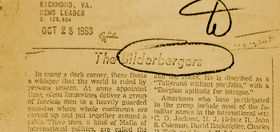Difference between revisions of "James Lucier"
(a bit more) |
m (Text replacement - " ans " to " and ") |
||
| (2 intermediate revisions by 2 users not shown) | |||
| Line 12: | Line 12: | ||
==Career== | ==Career== | ||
[[image:1963 Bilderbergers.jpg|left|280px]] | [[image:1963 Bilderbergers.jpg|left|280px]] | ||
| − | In 1963 Lucier wrote a short piece entitled ''The Bilderbergers'', one of the earliest pieces published | + | In 1963 Lucier wrote a short piece for the [[Richmond News Leader]]<ref>https://www.conspiracyarchive.com/2015/08/08/bilderberg-consultant-a-direct-confrontation-is-recommended/</ref> entitled ''The Bilderbergers'', one of the earliest pieces published in {{ccm}}. This caused some concern in the group, which tasked [[Curtis Hoxter]] with determining how the article got published.<ref>http://www.conspiracyarchive.com/tag/bilderberg/page/2/</ref> |
| − | Lucier was a staff member of the [[U.S. Senate]] for 25 years, and for some years a staff director of the [[U.S. Senate Committee on Foreign Relations]]. For 24 years he was "a key aide" to [[Jesse Helms]]. (Note that another [[Cercle]] attendee, [[John Carbaugh]] was as well). In 1998, Lucier was dismissed in a mass dismissal which "resulted from Mr. Helms's feeling that his minority staff was pursuing an independent agenda, isolating him from the Bush Administration and other Senate Republicans." [[Bud Nance]], a retired Navy admiral | + | Lucier was a staff member of the [[U.S. Senate]] for 25 years, and for some years a staff director of the [[U.S. Senate Committee on Foreign Relations]]. For 24 years he was "a key aide" to [[Jesse Helms]]. (Note that another [[Cercle]] attendee, [[John Carbaugh]] was as well). In 1998, Lucier was dismissed in a mass dismissal which "resulted from Mr. Helms's feeling that his minority staff was pursuing an independent agenda, isolating him from the Bush Administration and other Senate Republicans." [[Bud Nance]], a retired Navy admiral and schoolfriend of Helms who had been appointed staff director two months previously stated that "I felt we had too much overhead and not enough operators... It was difficult for me to see exactly who was doing what."<ref>http://www.nytimes.com/1992/01/08/us/panel-s-top-gop-staff-is-dismissed-by-helms.html</ref> |
==Africa== | ==Africa== | ||
| − | He and senator Helms attended and attempted to influence the [[Lancaster House talks]] between [[Britain]] and [[Rhodesia]], in support of [[Ian | + | He and senator [[Jesse Helms]] attended and attempted to influence the [[Lancaster House talks]] between [[Britain]] and [[Rhodesia]], in support of [[Ian Smith]]'s [[apartheid]] government.<ref>https://www.nytimes.com/1979/09/20/archives/british-accuse-senate-aide-on-rhodesia-obstacle-to-an-accord.html</ref> |
Lucier is a "deep thinker whose sense of history is nothing short of remarkable," Jessie Helms said.<ref>https://www.washingtonpost.com/archive/politics/1979/11/27/two-helms-point-men-locking-horns-with-the-liberals/5a1fdfba-ab13-426e-8067-c7cf8de8bb21/</ref> | Lucier is a "deep thinker whose sense of history is nothing short of remarkable," Jessie Helms said.<ref>https://www.washingtonpost.com/archive/politics/1979/11/27/two-helms-point-men-locking-horns-with-the-liberals/5a1fdfba-ab13-426e-8067-c7cf8de8bb21/</ref> | ||
| − | Lucier's interest in Africa affairs was evident in his writings about that same period. For "American Opinion," a journal with ties to the | + | Lucier's interest in Africa affairs was evident in his writings about that same period. For "American Opinion," a journal with ties to the [[John Birch Society]], he wrote in 1963 about the drift of African leaders toward socialism. And at another point, he wrote of black African leaders who "have learned to grasp only the concept that one eats one's enemies." |
Lucier is the "'inside man in the skunk works,' as he calls himself, or Lucifer as others sometimes refer to him", who prefers to scheme great schemes offstage. Helms and company "are on the borderline between fringe and serious." said one journalist who covers them. They are winning little victories that portend more." | Lucier is the "'inside man in the skunk works,' as he calls himself, or Lucifer as others sometimes refer to him", who prefers to scheme great schemes offstage. Helms and company "are on the borderline between fringe and serious." said one journalist who covers them. They are winning little victories that portend more." | ||
| − | It was the Helms staff, not the State Department, which in 1978 brought Rhodesian leaders to the United States to introduce them around, at one point using the issue of [[freedom" of speech]] to pave the way. They saw early that liberal journalists were vulnerable to an appeal to fairness, and they could hoist them on their own petard," said [[Stephen Rosenfeld]], columnist for [[The Washington Post]]. "For example, they could argue that [the Rhodesian leader backed by Helms] was more liberal than the [group] toward which the administration was tilting." | + | It was the Helms staff, not the [[US State Department]], which in 1978 brought Rhodesian leaders to the United States to introduce them around, at one point using the issue of [[freedom" of speech]] to pave the way. They saw early that liberal journalists were vulnerable to an appeal to fairness, and they could hoist them on their own petard," said [[Stephen Rosenfeld]], columnist for [[The Washington Post]]. "For example, they could argue that [the Rhodesian leader backed by Helms] was more liberal than the [group] toward which the administration was tilting." |
Lucier later became Senior Editor of the US national newsweekly, ''[[Insight on the News]]''.<ref>http://www.zoominfo.com/p/James-Lucier/1809422</ref> | Lucier later became Senior Editor of the US national newsweekly, ''[[Insight on the News]]''.<ref>http://www.zoominfo.com/p/James-Lucier/1809422</ref> | ||
Latest revision as of 06:55, 18 December 2023
( author, deep state functionary) | |
|---|---|
 | |
| Born | 1934 |
| Alma mater | • University of Michigan • University of Detroit |
| Member of | Le Cercle |
Cercle attendee, "inside man in the skunk works," as he calls himself, or Lucifer as others sometimes refer to him. | |
James P. Lucier (pronounced La-SEAR), is an author, and was a staff member of the United States Senate for 25 years, attendee of Le Cercle and former staff director for the US Senate/Committee on Foreign Relations.[1]
Career
In 1963 Lucier wrote a short piece for the Richmond News Leader[2] entitled The Bilderbergers, one of the earliest pieces published in commercially-controlled media. This caused some concern in the group, which tasked Curtis Hoxter with determining how the article got published.[3]
Lucier was a staff member of the U.S. Senate for 25 years, and for some years a staff director of the U.S. Senate Committee on Foreign Relations. For 24 years he was "a key aide" to Jesse Helms. (Note that another Cercle attendee, John Carbaugh was as well). In 1998, Lucier was dismissed in a mass dismissal which "resulted from Mr. Helms's feeling that his minority staff was pursuing an independent agenda, isolating him from the Bush Administration and other Senate Republicans." Bud Nance, a retired Navy admiral and schoolfriend of Helms who had been appointed staff director two months previously stated that "I felt we had too much overhead and not enough operators... It was difficult for me to see exactly who was doing what."[4]
Africa
He and senator Jesse Helms attended and attempted to influence the Lancaster House talks between Britain and Rhodesia, in support of Ian Smith's apartheid government.[5]
Lucier is a "deep thinker whose sense of history is nothing short of remarkable," Jessie Helms said.[6]
Lucier's interest in Africa affairs was evident in his writings about that same period. For "American Opinion," a journal with ties to the John Birch Society, he wrote in 1963 about the drift of African leaders toward socialism. And at another point, he wrote of black African leaders who "have learned to grasp only the concept that one eats one's enemies."
Lucier is the "'inside man in the skunk works,' as he calls himself, or Lucifer as others sometimes refer to him", who prefers to scheme great schemes offstage. Helms and company "are on the borderline between fringe and serious." said one journalist who covers them. They are winning little victories that portend more."
It was the Helms staff, not the US State Department, which in 1978 brought Rhodesian leaders to the United States to introduce them around, at one point using the issue of freedom" of speech to pave the way. They saw early that liberal journalists were vulnerable to an appeal to fairness, and they could hoist them on their own petard," said Stephen Rosenfeld, columnist for The Washington Post. "For example, they could argue that [the Rhodesian leader backed by Helms] was more liberal than the [group] toward which the administration was tilting."
Lucier later became Senior Editor of the US national newsweekly, Insight on the News.[7]
Deep political connections
He attended Le Cercle meetings in 1982, 1984, 1985 and probably other occasions.[8]
Events Participated in
| Event | Start | End | Location(s) | Description |
|---|---|---|---|---|
| Le Cercle/1982 (Wildbad Kreuth) | 11 June 1982 | 13 June 1982 | Germany Hanns Seidel Foundation | 1982 conference organised by Franz Josef Bach. The participants were guests of Franz-Josef Strauss. The first page of the attendee list was published online in 2011 |
| Le Cercle/1984 (Capetown) | 12 January 1984 | 15 January 1984 | South Africa Stellenbosch Capetown | 4 day meeting of Le Cercle in Capetown exposed after Joel Van der Reijden discovered the attendee list for this conference and published it online in 2011 |
| Le Cercle/1985 (Washington) | 7 January 1985 | 10 January 1985 | US Washington DC | 4 day meeting of Le Cercle in Washington exposed after Joel Van der Reijden discovered the attendee list for this conference and published it online in 2011 |
References
- ↑ http://www.jamesmonroe.org/lucier.html
- ↑ https://www.conspiracyarchive.com/2015/08/08/bilderberg-consultant-a-direct-confrontation-is-recommended/
- ↑ http://www.conspiracyarchive.com/tag/bilderberg/page/2/
- ↑ http://www.nytimes.com/1992/01/08/us/panel-s-top-gop-staff-is-dismissed-by-helms.html
- ↑ https://www.nytimes.com/1979/09/20/archives/british-accuse-senate-aide-on-rhodesia-obstacle-to-an-accord.html
- ↑ https://www.washingtonpost.com/archive/politics/1979/11/27/two-helms-point-men-locking-horns-with-the-liberals/5a1fdfba-ab13-426e-8067-c7cf8de8bb21/
- ↑ http://www.zoominfo.com/p/James-Lucier/1809422
- ↑ https://isgp-studies.com/Le_Cercle_membership_list
